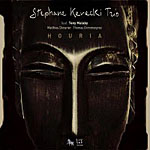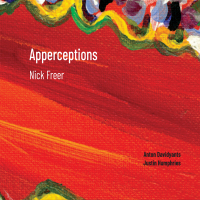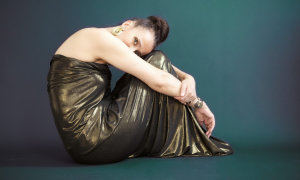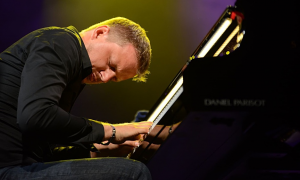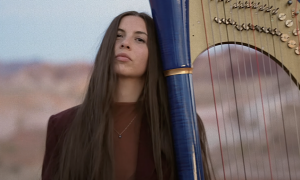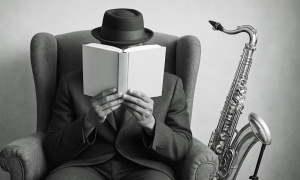Home » Jazz Articles » Interview » Dee Dee Bridgewater: Dee Dee on Billie
Dee Dee Bridgewater: Dee Dee on Billie
 It is almost inevitable for most people to think of Billie Holiday as a wounded human being who suffered, struggled and eased her pain with drugs and song lyrics on her way to self destruction in 1959. In her greatness, Billie was as devastating and as devastated as a summer with no water. And yet her magnetism, her very soul picking through her vocal chords and reaching out to the world, her goodness as a citizen of a world that couldn't seem to quite figure out whether to protect her or to incarcerate her, made her who she was: the voice jazz music will never be able to forget.
It is almost inevitable for most people to think of Billie Holiday as a wounded human being who suffered, struggled and eased her pain with drugs and song lyrics on her way to self destruction in 1959. In her greatness, Billie was as devastating and as devastated as a summer with no water. And yet her magnetism, her very soul picking through her vocal chords and reaching out to the world, her goodness as a citizen of a world that couldn't seem to quite figure out whether to protect her or to incarcerate her, made her who she was: the voice jazz music will never be able to forget.Holiday's ever-present, delicate inner balance, as a black woman with no civil rights but with a certainty within her heart that she was bigger than life, allowed her to sing the way she did. She lived in every song she ever recorded. Love teased, bullied and damaged her. She turned to music every time, and her voice was a map full of dirt roads and hidden places where she would find a quiet corner to rest her weary bones and cry herself to sleep. The world watched her fall to her knees over and over again, to then stare at her in awe every time she rose back up, a little more confident each time, but a little more hopeless, too. She had known it all— poverty, violence, rape, racism, prison, narcotics, loneliness, divorce—yet she still managed to become that Lady Day that Lester Young saw, and to hold on to her sense of humor, jazz and her love for life, to stay alive for as long as she did.
That is exactly what Dee Dee Bridgewater wanted to revisit in her new studio album, Eleanora Fagan (1915-1959): To Billie with Love from Dee Dee (Decca, 2010)—the strength despite the horror, the smile despite the pain, the wit despite the silence. With a stellar group of musicians, ranging from Christian McBride on bass and Edsel Gomez on piano to James Carter on tenor sax, bass clarinet and alto flute, and Lewis Nash on drums, Bridgewater has now completed an involuntary circle of love that started years ago, when her ex-husband, Cecil Bridgewater, first suggested that she listen to the legendary Billie Holiday.
Needless to say, it is quite an experience to listen to this woman sing just about anything. One can't help but admire the versatility of her many talents, but when it comes to singing, Bridgewater always is at the top of a game that has spoiled her for years now, willing to take as much as possible from such a creative individual. Treating her voice as one of the instruments of the band, she has learned to blend with the music, to interact with it as if she were a magnificent horn played by an astonishingly skilled musician.
Her rendition of "Mother's Son-In-Law" is especially remarkable, accompanied by a stunning solo by Christian McBride on bass. The energy transforms with every note. Bridgewater's playful exquisiteness reaches the status of perfection and McBride's soliloquy turns into a breathtaking conversation with her voice. James Carter and his tenor saxophone interact with her on "Fine and Mellow" in a way that would have made Billie herself grin from ear to ear. In the meantime, Lewis Nash leaves no room for doubt: he is one fine drummer and a gift to anybody's soul. And pianist Edsel Gomez, also responsible for the arrangements, stands tall and proud, whispering to Bridgewater's heart in every song. What a fabulous team this is.
This might just be the best Dee Dee Bridgewater the world has ever heard.
All About Jazz : Why Billie Holiday now?
Dee Dee Bridgewater : Why Billie Holiday now? Why not?! I mean, yeah, why not, but for me "why now" is a good question. I was looking for a way to take a break without touring and still earn money last year, and I came up with this brainy idea of producing myself because, you know, I'm just a producing machine now that I've been producing my own albums [laughs]. Why not go to another area and produce myself theatrically? So I don't think very big, you know, but I was going to see if I could get the play Lady Day that I've done in Paris and in London— about Billie Holiday, where I portray Billie Holiday—which is basically a one-woman show with a quartet on stage. I was going to see if I could get the funding and put the play on Broadway or off-Broadway or somewhere else, so I auditioned the play this year, from January until August.
I was running around, meeting with the original theaters and talking to producers and all that kind of stuff, putting budgets together and finding out all the things that I'd need to do to produce it on Broadway and off-Broadway, and all of that. And I could not get the funding. So I decided, as part of this project that I wanted to do, [upon] what would be considered a kind of cast recording, where I would do music from the play, but more in the '50s style, more in the line of Billie and her recordings. And a second CD, [of] contemporary arrangements, being myself, which would be more of a celebration of Billie Holiday.
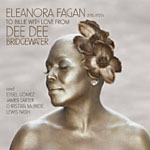 So, trying to be ahead of the game, I said I should probably try and record this contemporary album. My pianist for five years, Edsel Gomez, got the arrangements done. I asked him to do the arrangements for this contemporary album and then also one more '50s style for the play. So I asked him to start off on the more contemporary style, and we kinda just went through the book of the play, and I said, "Oh, do the arrangements on this one first, and do this one, and this one..," so I ended up with a list of like 15 songs that I wanted him to get started with, that I thought would be good for the more contemporary versions of the songs that I wanted to do for the show. But, like I said, I never could get the play out, but I had been hoping I would be in rehearsal close to doing something by February of this year on stage somewhere, you know, or at least by April.
So, trying to be ahead of the game, I said I should probably try and record this contemporary album. My pianist for five years, Edsel Gomez, got the arrangements done. I asked him to do the arrangements for this contemporary album and then also one more '50s style for the play. So I asked him to start off on the more contemporary style, and we kinda just went through the book of the play, and I said, "Oh, do the arrangements on this one first, and do this one, and this one..," so I ended up with a list of like 15 songs that I wanted him to get started with, that I thought would be good for the more contemporary versions of the songs that I wanted to do for the show. But, like I said, I never could get the play out, but I had been hoping I would be in rehearsal close to doing something by February of this year on stage somewhere, you know, or at least by April.
I was getting this album together to be a part of the whole project, so when the project didn't happen, Universal Records asked me if they could just put out the album I had recorded. I told them that I didn't have the artwork, and I was planning on taking my time and putting it out with the play, a double CD, and I really didn't think about it being an individual record. But Universal said they thought it could stand on its own, so here I am now. The release should be in February, instead of April.
AAJ: So it's almost like an accident of an album, a serendipity album.

DDB: It is serendipitous, it totally is. All of the musicians that are on the album—who are Edsel Gomez at the piano and arrangements, Christian McBride on bass, Lewis Nash on drums and James Carter on sax—they were all available to do this album the first ten days of June. The sound engineer that I have for this album is my sound guru, as I call him, Al Schmitt—very famous sound engineer that I'd done my first album with, and then more recently I had used him as a sound engineer in France. So he was only free the first two weeks of June, and he suggested a recording studio, which was Avatar, and the only days they had available were these four days in June. So I recorded the album. Everything was like...weird. Everybody was free, the studio was free. So I said, "Let's get to work, and hurry up on those arrangements!"
AAJ: That was absolutely meant to be.
DDB: Yeah [laughs]. It's how I make my life. If I want to do something, I need a sign, I need a clear sign that I'm supposed to do that thing. Otherwise, just like with this option for the play—it was just like all kinds of stuff happened, and I thought, "Well, maybe I'm not supposed to do the play." I let it go in August. And it was when I let it go that Universal International in London said, "Well, since you got that CD that you've done, what about releasing that?" And I was, like, "Ooookay," and I've been running ever since, to get it ready for the release date.
AAJ: Well, it's a gorgeous album. Sometimes when people record tributes, you never know what you're going to find, but it's gorgeous.
DDB: Oh, thank you. It's a celebration of Billie, which is something people don't usually do when they do a tribute to Billie Holiday. You know, it's kind of predictable, and very typical—the tragic side of her. And not very many people know that she was a funny woman, and she was just one of the fellows when she was out on the road, and she could crack a joke just like the rest of them, and could talk like a sailor, you know? And then she would be this gorgeous, mysterious creature on stage. And it is almost like she had a double identity. When I researched for the play, it's when I discovered all of that information. So I decided, just like with most of the things I do, that I wanted to do a different take on it, especially if it's something other people have done, or a similar idea, even though it might be different music. I try and bring out some other quality to that project that hasn't been explored by others in some of the projects. So with this one, I said, "Well, let me make it a celebration."
Because it was a celebration for me, in many levels. It was a celebration because of the musicians that I had; working again with Al Schmitt; a celebration because this was really going to be a live album, because I had decided that I had to be in the studio with these gentlemen, I had to. Because in order for us to connect, I had to sing, so it was the whole unit—so we had interaction and reaction. All the songs in the album are a first or second take; there's maybe one, I think, that is a third take. No vocal over-dubbed, nothing! I had to correct two words on one song, because I sang the wrong words [laughs]. So it's really a live album, and I think that makes it stand out. We recorded that album in three days, between the 1st and 5th of June. We did four songs a day. And it was the most intense experience I've had in a long time, and certainly my most intense short-term recording experience. It was something else. And then I had all these guys that I love. These are my babies, I love these men! I love the musicianship, and you know, there were no egos.
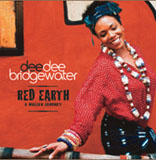 Everybody came ready to celebrate Billie, and we were all very happy to finally have the opportunity to work together. So it was just a wonderful thing. And I didn't know, for example, that Christian and Lewis Nash are kind of like a recording duo— they've done 70 albums together. Mine makes 71, I guess. And I had done a project with Lewis on February last year, a tribute to Max Roach, that had been commissioned by the Symphony Hall of Chicago. And it was incredible, and from that experience, we kind of bonded musically. We rehearsed to get a feel of each other for that experience, but it ended up being something we improvised. But what we did was incredible, oh my gosh! So I asked him if he'd be interested in recording with me at some point in time, and he said, "Heck yes, Dee Dee!" So I called.
Everybody came ready to celebrate Billie, and we were all very happy to finally have the opportunity to work together. So it was just a wonderful thing. And I didn't know, for example, that Christian and Lewis Nash are kind of like a recording duo— they've done 70 albums together. Mine makes 71, I guess. And I had done a project with Lewis on February last year, a tribute to Max Roach, that had been commissioned by the Symphony Hall of Chicago. And it was incredible, and from that experience, we kind of bonded musically. We rehearsed to get a feel of each other for that experience, but it ended up being something we improvised. But what we did was incredible, oh my gosh! So I asked him if he'd be interested in recording with me at some point in time, and he said, "Heck yes, Dee Dee!" So I called.
AAJ: And how did you decide on James Carter?
DDB: I couldn't think of anybody else. I love James Carter. These are all guys that I always wanted to work with. And Christian and James are my little flirts—every time I see them, I flirt with them. We just got this whole thing going, this history [laughs]. I think I've known Christian now for 15 years, and James about the same time, and I just think they're extraordinary musicians.
AAJ: And don't you think Christian should be like 70 years old?
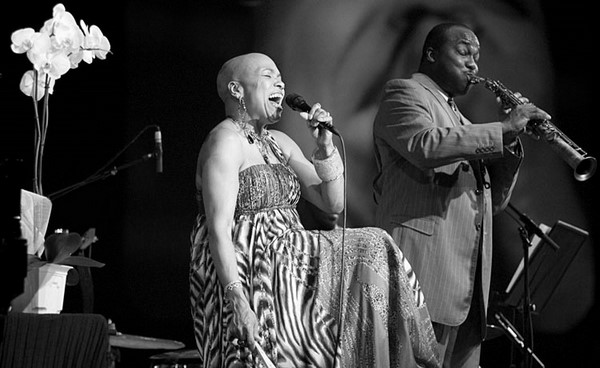 Dee Dee Bridgewater with James Carter
Dee Dee Bridgewater with James Carter
DDB: Oh yeah, absolutely. He's definitely an old spirit in a young man's body. He's definitely been here before. And on a musical level, he and I are really, really connected. And James as well. Well, I just have some really strong spiritual connections with all these gentlemen. I think it comes through on the CD.
AAJ: This is not the first time you have been connected with Billie Holiday in a project, whether it's a play or music. So is she an influence to you?
DDB: No, I don't have any main influences. If I had to talk about influences, Billie would not be a heavy impact. [Silence] Well, I can't even say that—that's wrong, Dee Dee, don't even try that! Billie was an influence, because when I was with my first husband, Cecil Bridgewater, when we were just dating before we even married, he suggested that I listen to Billie, and I was, like, "Ugh! I don't want to be sad!" I wanted to have a good time; I was 19, so I was, like, "Please!" I was into Soul, R&B, Blues. I wanted to have a good time, so I didn't want to listen to any Billie Holiday. But he insisted that I listen to Billie, even after we were married. So, to keep the peace, I finally listened to her, and I was, like, "I'm sorry, I don't get it." And then I happened to find her autobiography when I was at a book store one day, and I bought it and read it.
It was her story that got me, because I thought that I saw a lot of similarities in our lives, even though we're from different periods. Thank God I'm from a period that knows the devastation of hard core drugs, and so I didn't have to go do that. But I certainly had been sexually abused, and I had made some very odd choices in men, in the men in my life, and I've always been attracted to guys that eventually turn out to not be good choices for me. So I have dealt with abuse and, you know, all that sort of stuff. And also, I was raised in a Catholic school. My mother had me baptized when I was seven, and I didn't want to be a Catholic, and I had problems with the nuns. So, you know, just so many similarities—that is a little uncanny, but that is what got me interested in Billie. And then when I listened to her music after that, it was a whole different story. And I could then understand her singing. The way that she sang, it just made sense to me, after reading her autobiography. She doesn't have an incredible range, and I thought that to be a great singer you had to have an incredible range. For me, the ultimate quality of a jazz singer is: you have to scat. And Billie didn't scat. But she sure improvised the heck out of the melodies, and her phrasing was like a musician's phrasing. And that is something that I've come to appreciate more and more over the years.
I still didn't have a complete appreciation of it by the time that I started first listening to her. And then after I started listening to her I got my first professional job in New York, when I first moved to New York in 1971, with Thad Jones. And the first time I sang with them, Thad Jones said to me, "So, you've been listening to Billie Holiday?"
I said, "Yes."
"You've been listening to this one?"
"Yes."
"And that one?"
"Yeah."
"Stop! I don't want you listening to any more singers. Your ears are like sponges, so we can hear all those singers. If you want to have your own sound, you have to stop listening to the singers and only listen to the music."
That's the best advice I've ever received, and I stopped. So I didn't listen to her again until I did the play.
AAJ: It was a good advice.
DDB: It was the best advice, seriously. And I tell all singers to listen to this advice. Because now that I am even older, young singers—when I am doing the master classes, like private vocal lessons with these kids—a lot of them listen to me, so I go, "Oh God, no, no, no!" You have to listen to some musicians, even if you don't scat, so that you can sing in your own voice and find your way with songs. So there you go.
AAJ: It's interesting that you said that you wanted to make a joyful celebration of Billie Holiday.
 DDB: I was trying to project that positive side. There has been so much of the negative. Her whole history—she is a tragic figure. This woman would not have been able to survive in the time that she lived with the raging racism and the horrible abuse that African Americans—we were called "colored" then—received from the white people. And you know, I don't think anybody can imagine the humiliation of having to go through a kitchen, not being able to stay in the hotel where you performed because of the color of your skin, having to look for places to stay in the black community. The long bus rides—when in the South, she actually saw lynched bodies, going on some the roads that she drove, you know. That's the stuff that she actually experienced. So you couple that with her personal life story and all the abuse that she experienced as a child, and the prostitution. All of that, and then she was a woman. I think I would have used drugs back then, too. How else are you going to escape? How are you going to be able to go on stage on any given day and be something that people are expecting you to be? How do you deal with all that misery and the suffering and the horrors? So she put it into her music, and her music became her outlet, and the music kept her alive as long as she was. That's my take on it.
DDB: I was trying to project that positive side. There has been so much of the negative. Her whole history—she is a tragic figure. This woman would not have been able to survive in the time that she lived with the raging racism and the horrible abuse that African Americans—we were called "colored" then—received from the white people. And you know, I don't think anybody can imagine the humiliation of having to go through a kitchen, not being able to stay in the hotel where you performed because of the color of your skin, having to look for places to stay in the black community. The long bus rides—when in the South, she actually saw lynched bodies, going on some the roads that she drove, you know. That's the stuff that she actually experienced. So you couple that with her personal life story and all the abuse that she experienced as a child, and the prostitution. All of that, and then she was a woman. I think I would have used drugs back then, too. How else are you going to escape? How are you going to be able to go on stage on any given day and be something that people are expecting you to be? How do you deal with all that misery and the suffering and the horrors? So she put it into her music, and her music became her outlet, and the music kept her alive as long as she was. That's my take on it.
She was brave, she was courageous, she was a militant. When Bruce Allen brought "Strange Fruit" to her, she sang it. She was kicked out of clubs for singing that song. And she insisted on it until she was able to record it! That takes a courageous and brave woman; that takes a strong-willed woman that would buck society. And she bucked society. And she stood up for herself and said, "I am who I am. This is what I am; take me as I am."
 AAJ: And how does it feel today to sing a song like "Strange Fruit," with all the changes that have happened in the world ever since?
AAJ: And how does it feel today to sing a song like "Strange Fruit," with all the changes that have happened in the world ever since?
DDB: Well, to me, it's a difficult song to sing. It's not really concert material and it really isn't club material. I recently came back from Japan; I was doing the Blue Note in Japan. And I would do the song, and just the reaction of the people in a small setting like that—maybe it was the proximity, where people are too close, where people were, like, at my feet, I could bend down and put my glass on a table, and mess around with them, which is what I like to do in clubs, you know, pull the hair, take glasses, tease them— I found that singing "Strange Fruit" in a club was really unsettling for people, really unsettling. So I stopped doing in the clubs. I felt that there needed to be some distance, so that they could take it in and at the same time not feel like it was so in their face, as it is in a club. But to do it today [Sigh], I don't know, when I do it, I have the memories of my childhood and the racial problems that I had to deal with.
You know, I was born in the 1950s, so I came up in the end of the whole racism stuff, with Martin Luther King, Jr. and Malcolm X and the Black Panthers, you know, so we were taught to fight for ourselves in the black community—Africanism, and wear your hair natural and all of that. I lived through all of that. But at the same time, I have had racial experiences as recent as the year 2000, so in a way it's a never-ending journey.
AAJ: How were your musical beginnings? How do you see them today?
DDB: I was a blessed singer. I was in the right place in the right time, musically speaking and speaking in jazz terms, because I had all these incredible father figures in jazz who were jazz legends. So when I first started singing, at 21 or 22, I was singing with people like Dexter Gordon, Sonny Rollins, Max Roach, Dizzy Gillespie, Clark Terry, Pharoah Sanders, Harry "Sweets" Edison, Ray Brown—I grew up with that! All these legends, all these men took me under their wings. I grew up in that surrounding; those were my peers, kind of. I didn't know a lot of musicians my own age. And it was wonderful.
I think I was one of the last singers out here today who grew up with a big band, and that is invaluable music training: learning how to sing with a big band with an arrangement, how to project one's voice over a big band, because it was rare that we really had good sound system. So I had to learn how to project over these instruments because it was based in almost acoustic singing. I had a wonderful woman who taught me how to use my voice, how to breathe properly. I never took singing lessons, but she worked with me on those areas. Her name was Gladys de Jesús. She was Cuban and lived in Manhattan. So that's it, that's all I had. The rest was hands-on experience. I was very fortunate; I was extremely, extremely lucky. I was blessed. And my voice is God-given; I've always had this voice. And not too long ago I heard my first recording under my first name, and I said, "My God, my voice hasn´t changed! It's a little more mature now, but I still have the same phrasing, holy cow! It's me. I am. I was me back then and it's still me now, the same me."
Of course, I've had some more experiences, so there is a more mature me, and a musically more knowledgeable me, a more experienced me, but my voice hasn't changed and my range is still the same. I haven't lost my range, thank God. So there you go, that's how I am today, compared to who I was. It did take all of those experiences that I had and now I use them to my advantage. And because I was always working with musicians, my mindset was that of a musician. I don't think like a singer; I think like a musician. And I consider myself to be a musician. I hate when somebody comes to me and says, "Oh yeah, I know, you do jazz singing." I am, like, "Excuse me? Are you talking to me? A jazz singer?" Oh, the whole "you singers," oh no, not me. So I'm a tougher broad as I get older, even though I can still be sweet and all of that. I am a disciplinarian, so they say. I've taken a lot from musicians, I've given them a lot of space, but now I don't have the time, and when I hire a musician he gets his music well in advance—at least one month and a half in advance—so he can learn it. He gets live recorded music or albums, and then he gets the arrangements. He gets his parts, so there is no excuse for him not to come on stage on the first concert knowing this music inside-out. Recently, and for this project, I had a couple of musicians that thought they could come in this project, because they were thinking I was just singing and I would have these lousy arrangements, so imagine what they did on stage, in a concert.
AAJ: Surprise, surprise.
DDB: If musicians don't do their job, you can cut their pay, so I did that, and I've never done that before. "How dare you come to this concert—and it was big concert—and not be prepared and be playing these arrangements all wrong? How dare you embarrass me like that? Would you do that if you were working with Herbie Hancock? I don't think so!" And then I started listing all these musicians: "Would you do that if you were working with...? So you don't do that with me, either. You may think you can do that with other singers, but you don't do that with me, because I am not a singer, I am a musician."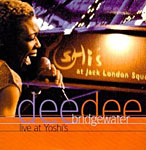 And they said, "I'm sorry," and I said I was not going to pay them what they requested for them to give me some half-b.s. stuff. Who do you think you are, Adonis? This is not Greek Mythology, this is a concert. And this is real music, and it's challenging music, and if you don't have it together tomorrow, or the day after tomorrow, and you don't eat, sleep and drink this music, that will be your last gig, or maybe you won't even be on the gig, because I don't need you. That's the other thing, welcome to my world. It's an embarrassment, I don't need you. You are not working with me making this musical statement. I can even sing with a piano, if I have to, and still get it across.
And they said, "I'm sorry," and I said I was not going to pay them what they requested for them to give me some half-b.s. stuff. Who do you think you are, Adonis? This is not Greek Mythology, this is a concert. And this is real music, and it's challenging music, and if you don't have it together tomorrow, or the day after tomorrow, and you don't eat, sleep and drink this music, that will be your last gig, or maybe you won't even be on the gig, because I don't need you. That's the other thing, welcome to my world. It's an embarrassment, I don't need you. You are not working with me making this musical statement. I can even sing with a piano, if I have to, and still get it across.
Oh yeah, I went there. I made the musicians put their papers out. They kept giving me all of these excuses! And even Edsel (Gómez) came saying, "I come from a Spanish..."
"When did you become an actor?"
He was about to tell me how he read this book on Stanislavski, and how you need to have a focal point instead of a music focal point, even though he knows it, and blah, blah, blah. And I was, like, "You make your piano your focal point, that's the instrument you're playing! Concentrate on the piano. You know the songs, you arranged these songs!" And everybody came with their excuses.
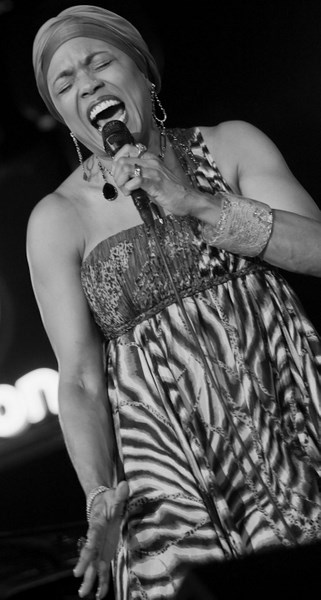 AAJ: It is true that they have a tendency to see vocal jazz as a step down from instrumental jazz.
AAJ: It is true that they have a tendency to see vocal jazz as a step down from instrumental jazz.
DDB: Oh yeah. And they were after all of that, oh yeah. "You're right Dee Dee, of course I know the music," and blah, blah, blah. Not only do I learn the arrangements, but the lyrics, and I have an idea of all of your parts. I learned the songs, the melody, so I'm learning more than you are, and I don't have any paper, and you are not even learning the lyrics, so if I go up on a lyric you won't even know it! Sometimes I think that being a technically trained musician can be a handicap! Because they come from an analytical point of view, and they have all this stuff that they talk about, the chords, and I'm, like, "You know, dudes, come on. Give it to me straight. Cut the B.S.; you can do that someplace else."
AAJ: Makes you wonder how some of them would have survived with Billie Holiday herself.
DDB: They would have been kicked out of the band or they probably wouldn't have sat in the band. And there are musicians that I don't play with and I won't play with, because we are not on the same wavelength. In your line of work, you tend to want to get players that are of a like mind. If you are going to be a team, you have to be a team player. And that is how I look at it. Everybody is a team player in this project. So the project is the sum of its parts, the whole is the sum of its parts. So everyone is integral to making this one beautiful musical machine. We've all got to be on the same page. We have to be reading the same map; we have to know all the different detours we can take. If somebody decides they want to go down another road, you have to be ready to go down that road. It's kind of like the GPS system [laughs]. We don't have to say, "Oh, I am changing the route." You got to be in it, in the moment.
AAJ: So how much of the person you are today, musically or personally, do you owe to your family, growing up, your father?
DDB: My parents were very influential in who I am today. All my musicality came from my father's side of the family, and all of my senses of family came from my Mom. Once I made a decision that I wanted to be a jazz singer as a profession, a singer and an actress, my father got me started, and then my mother took over and nurtured me and supported me, and she has been my biggest supporter and my biggest fan. All of my practical stuff came from my mommy. And then my step- father worked with me on my business sense. As Hilary Clinton put it, "It takes a village to raise a family."
AAJ: What's happiness to you?
DDB: Happiness is a relative term, isn't it? It's very relative to me. Happiness to me is having a roof over my head. Knowing today that I have accomplished all the things that I have—that I've realized all of the dreams that I ever had when I was a little girl, in one matter or another, having had all the experiences that I've had—and became the person that I am today: that is happiness to me. There are days when you don't feel happy, and those days—I call them "lessen days" or "mourning days" or "shut-down days," or whatever is going on. But basically I am happy. I am happy with where I am, I am happy about my children, I have learned to love myself, and I am very proud that I decided to be a kind of renegade [laughs]—to be a rogue jazz singer, to set my own norms. Happiness is rooted to the person that you are asking and what their expectations are.
I have learned not to expect much from humans. I've learned to put my faith and my belief in God—in a higher power, in a power of prayer. I believe in prayer, I believe in God, I believe in angels, I believe in miracles, I believe I am a living miracle. I wouldn't be here if it wasn't for the grace of God. Many times, I could have gone down the wrong path, and He's always caught me in the nick of time. He's always saved me. So now I walk in faith; I walk in blind faith today. I've learned how to accept things as they are, not to force things. If they don't happen, they are not meant to be. I believe in that very strongly. I believe that things that are meant to happen will happen, and that when it's supposed to happen it's always very smooth, and that's proved itself over and over to be the case.
AAJ: If there was one single memory of you, or one achievement, or one song you have recorded, or something related to you that you could leave behind for people to remember you by, what would it be?
DDB: Just one? I think that would have to be my Red Earth (Emarcy, 2007) album. That is an album that was born out of my decision to embrace my African ancestry and to try to figure out where my ancestry was. I feel that it is a work of art that probably will stand the test of time. Well, I think all of my projects can stand the test of time, but I think that one is the most profound, because it shows the relationship with West African music, especially Mali. Malian music, I believe, is in the root of jazz and blues, and I wanted to show that correlation as well as the African tradition of the musical historians, the Creoles. I just think that would be a good representation of where I come from and where I'm at. That was a project that has changed me for life. I know them as my people.
I knew the music when I would listen to the music, and I could never understand why I always could sing and hum tunes that I've never heard before. And it turns out that those were all Creole songs. They really believe that your spirit doesn't forget. So when I would talk with the Mali musicians and told them what was going on, they were not surprised. "It's a proof that here's where you come from—your ancestors were from Mali." They went so far as to tell me which tribe I'm a descendant from—the Peul, which is a northern Malian tribe that lived in the Sahara, a nomadic tribe. And I'm a nomad; I always called myself a gypsy, because I've lived all over the place. I even used the term nomad before. So my whole philosophy about life and the importance of the family—that all comes from the Malian culture, because family is very important for the Malian culture. I've always believed that if I make money, I need to share that money with my family; that I should be able to share the blessings that I've received with my family, and that is a very strong Malian culture.
So I think that would be most indicative of me because I wrote the English lyrics to the Creole songs, and I was the first foreign artist that has done an African project, and that has done a kind of loose interpretation of the Creole songs so that people can have an idea of what the singers are singing and the dialect. So I also gave a glimpse of African culture, and a pretty decent idea of what African music is about. So you got these two aspects of African-American culture, and I am very proud of it—it was ground-breaking. Since I did that album, some others are using Malian musicians playing the instruments that I had on my album, and are going to Africa, and doing projects that they would have not done otherwise. Performing and having the African musicians and singers on stage with me was eye-opening for a lot of people.
 A lot of African-American people came to me afterwards and said things like, "I never wanted to be related to Africa in any way, or African people," and I was, like, "Don't feel bad. I was in the same place until I went there." And I wanted to show the beauty. Maybe Africa doesn't have the same kind of intellect that we have, but they have a culture and a history that we do not have, that we could certainly learn from. I say that to any African-American person—that if you want to understand yourself better, you need to go take a trip to Africa. And if there is a country that's speaking to you, that you are having in mind, that you want to go to, it's probably because that is where your ancestry is from. So you need to go visit that country and not be afraid. You have to be, of course, prepared when you go into those countries; that's a whole other issue. But don't be afraid of having an interaction with the African people. That's where I believe that I became totally free in terms of my singing. The more bluesy aspect of my voice came out of that project. This is Dee Dee.
A lot of African-American people came to me afterwards and said things like, "I never wanted to be related to Africa in any way, or African people," and I was, like, "Don't feel bad. I was in the same place until I went there." And I wanted to show the beauty. Maybe Africa doesn't have the same kind of intellect that we have, but they have a culture and a history that we do not have, that we could certainly learn from. I say that to any African-American person—that if you want to understand yourself better, you need to go take a trip to Africa. And if there is a country that's speaking to you, that you are having in mind, that you want to go to, it's probably because that is where your ancestry is from. So you need to go visit that country and not be afraid. You have to be, of course, prepared when you go into those countries; that's a whole other issue. But don't be afraid of having an interaction with the African people. That's where I believe that I became totally free in terms of my singing. The more bluesy aspect of my voice came out of that project. This is Dee Dee.
It was a groundbreaking album, and it opened up. It was very interesting because it caught the ear of people that I never thought it would, and as a result of doing that album I'm doing more orchestral work now, working with symphony orchestras. I'm doing more big band stuff, I'm doing a lot more stuff as a solo artist with the classic people than I've ever done before. I feel like I got a respect from the classical people that I don't think I had before, because of doing this album. The way that I sing on my new album, that is a new and improved Dee Dee, and I am best when I sing live, and it was through that wanting to do the Billie Holiday project that I was able to realize about another part of my live performances. Because all of those tracks on that CD, that's everyone playing together in the studio. It was live. When I wasn't singing, I was hollowing in my booth, moaning, groaning, more than on any other album I've ever done. What a nice and beautiful experience. So that is why I would pick Red Earth. It was just a great album, and it received Grammy nomination. All my albums, with the exception of one, have been Grammy-nominated. One won two Grammys.
Tags
PREVIOUS / NEXT
Dee Dee Bridgewater Concerts
Support All About Jazz
 All About Jazz has been a pillar of jazz since 1995, championing it as an art form and, more importantly, supporting the musicians who make it. Our enduring commitment has made "AAJ" one of the most culturally important websites of its kind, read by hundreds of thousands of fans, musicians and industry figures every month.
All About Jazz has been a pillar of jazz since 1995, championing it as an art form and, more importantly, supporting the musicians who make it. Our enduring commitment has made "AAJ" one of the most culturally important websites of its kind, read by hundreds of thousands of fans, musicians and industry figures every month.




